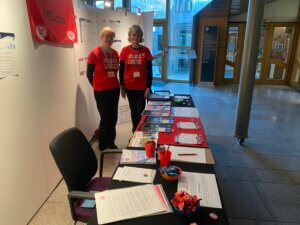Keep up-to-date on this issue by following the Twitter accounts @mecvsnieuws and @ME_gids
More than 10,400 signatures for the Dutch petition ‘ME is not MU(P)S’ (Medically Unexplained (Physical) Symptoms) was presented to Prof. van Gool, president of the Dutch Health Council three weeks ago on September 18th. The petition aims to hold the Dutch Health Council accountable for writing an advisory report to the Dutch Parliament on the state of the scientific knowledge with respect to ME (ICD G93.3). The Dutch Parliament had asked the committee to write the report. (See our earlier reporting about this petition last year).
Among the more than 10,400 signatures were many international ME experts like Dr. Weir, Dr. Booth, Dr. Zeineh, Dr. van Ness, Dr. van Elzakker, A. Whittemore, Dr. Dafoe, Prof. Racaniello, Prof. Coyne, Dr. Goudsmit, Dr. Wilshire etc. Also, “Invest in ME” officially signed the petition. They invited the Dutch Health Council “ME/CFS” committee to attend their biomedical conference this year. The committee had declined in 2016, this year they did not even bother to respond, not even after a reminder.
The fact that Dutch Health Council is writing an advisory report to the Parliament is the direct result of a Dutch Citizens’ initiative “Erken ME” (which translates as “Recognize ME”), which convinced the Dutch Parliament by means of more than 56,000 signatures in 2015 that something needed to change with respect to the lack of recognition of this disease (ICD G93.3), lack of adequate diagnosis, lack of appropriate care, ignorance and astounding lack of knowledge among health care professionals and complete lack of biomedical research in the Netherlands. After a 2005 Dutch Health Council report, no money for biomedical research was provided. All the money went to CBT research and development of a CFS guideline, which ended up not being authorised by patient organisations because the final result and the influence of the CBT/GET proponents and their BPS model was unacceptable to them. ME patients’ suffering as a result of this has been partly unnecessary.
Although the Dutch Citizen’s initiative and many Dutch patient organisations stressed that expertise with respect to ME is lacking in the Netherlands and that it was therefore important to include international biomedical experts (many of whom had already agreed to participate if invited), the Dutch Health Council ignored this. The Dutch Health Council had actually solicited such feedback before the start of the “CFS/ME” committee.
There is a fear now that the overrepresentation of committee members who are clear (bio)psychosocial (BPS) and CBT/GET proponents (some with direct working relationships to the ‘Wessely school’ and their UK PACE and FITNET NHS colleagues) will have a major influence on the advisory report (again). A report that will determine the future care of ME patients in the Netherlands as well as possible funding for research. Many of these BPS/CBT/GET professionals on the committee claim that ME is a functional disorder, or equate it with the non-existing diagnosis MU(P)S, or, even, as a Dutch MUS guideline claims an undifferentiated somatoform disorder! (The first author of the report is on the committee, another committee member has made this claim, as well.)
The lack of support and concerns about this committee cannot come as a surprise for Prof. van Gool (including concerns about conflict of interests). Such concerns have been pointed out by patient organisations/representatives to the Dutch Health Council from the start since March 2016.
The Dutch Health council has to adhere to the “code for the prevention of improper influence due to conflicts of interests”. Patients and patient organisations have serious doubts whether this code was properly followed. Several ME/CFS committee members have close working relationships with each other in the field of MU(P)S, CBT/GET and strive for (inter)national implementation of these interventions and receive external funding for their research. For example, two of the members work together on a 1.5 Million “MUS” project (CBT) for CFS patients, funded by health insurers. Prof. van Gool has received criticism after he claimed to members of Dutch Parliament that his process of appointing members to the Dutch Health Council (committee) was much more rigorous than what the NAM uses (it is not!). He made statements suggesting that a seat on IOM/committees could be bought. Clyde Behney, Executive Director Health and Medicine Division National Academies of Sciences, immediately corrected this false statement in an email. Prof. van Gool never withdrew or corrected that comment.
Because the petitionaries were too ill to leave their beds/homes, a patient representative (Rob Arnoldus, former chair of the Dutch ME/CFS Association) and some family members of severely ill patients went to The Hague on September 18th to present the petition. Truus and Wim Geuijen, the parents of Ingeborg Geuijen, a Dutch ME patient who sadly died of ME in 2015 and who was the first Dutch patient to have ME listed as the official cause of death, were present. As was Dr. Nico Vink, the father of Mark Vink. Mark Vink, a GP, and severe ME patient has written several important publications on PACE and showed that Dutch studies, like the Dutch FITNET study (now being replicated in the UK, one of the Dutch Health Council committee members is involved with FITNET UK), have the same flaws that can no longer go unnoticed or shouldn’t be accepted. Mark Vink was nominated for the John Maddox Prize for Standing up for Science (2016) for one of his PACE trial reviews. Mark Vink was interviewed by a major Dutch newpaper recently, talking about his research and his life with severe ME. Dr. Nico Vink read a letter by his son to Prof. van Gooland and gave him copies of many of his publications. In the letter, Mark Vink stressed the severity of the illness, the lack of care, why CBT/GET are not effective for ME, and why ME is not “MU(P)S.” (MU(P)S is a term and disease model based on assumptions and opinions, for which no objective evidence exists, and which is contradicted by the physiological evidence for this disease.) Mark Vink also stressed the larger problem that exists with respect to the (lack of) evidence for CBT/GET both in UK (PACE) and Dutch studies. He invited Prof. van Gool and the chair of the “ME/CFS” committee (Prof. Kramer) to his home to see for themselves what living with severe ME (in a dark room, bedridden) really entails. Rob Wijbenga, one of the patient representatives on the “ME/CFS” committee, was invited to be present as an observer.
When presented with the petition, Prof. van Gool said that he could vouch for the integrity of the ME/CFS committee members, and when pressed if he would take action given the serious concerns raised, said he would need to read the letter presented to him first.
Included with the letter were Dutch patient organisations’ supporting statements with respect to the petition, ‘ME is not MU(P)S’.
It has been more than 3 weeks now and the Dutch Health Council has yet to officially respond.
While Dutch patients are awaiting a meaningful response, the Dutch petition can still be signed to help strengthen our voice and press the Dutch Health Council for (re)action. See link below (you can sign from any country just don’t forget to click on the confirmation link in your email after you sign; once you have done that, your siganture counts).
https://petities.nl/petitions/me-is-geen-solk-wijzig-gezondheidsraadscommissie-en-houd-u-aan-de-adviesopdracht?locale=en
~
The letter which the petitionaries gave Prof. van Gool read in part:
“At this moment in time it is crucial for all stakeholders (patients, care professionals, health insurers, politicians / policy makers) that hypotheses and unfounded conclusions are separated from scientific facts. The situation and care for ME patients can only improve if care is based on (systematic review of the) scientific evidence, international expertise in the field of ME and above all, when it is based on and meets the care needs of patients themselves.
There is a great potential for harm for patients which arises from the organization of care that is not based on the latest, up to date, evidence and/ or based on the conclusions of compromised studies which are then translated into recommendations for future care, policy and research.
If you as the Dutch Health Council have not taken a full in-depth and critical look at the question whether the way we now organize care for ME patients truly has a sufficient scientific evidence base, and do not listen to the worries that have been expressed to you repeatedly, we consider that negligent.”
“To summarize, handing over more than 10,400 signatures for the petition ME is not MU(P)S, is a strong signal that there is a lack of support for the current committee that is tasked with looking at the state of the scientific knowledge with respect to ME. We urgently request that you take note of the worries that exist about to the lack of ME experts and the overrepresentation of MU(P)S and mental health professionals within your committee, which was also pointed out to you by many Dutch patient organisations. This also applies to concerns about the influence of conflicts of interest within this process. You have not taken any action on this matter. As a bear minimum it is necessary to ensure that a number of international biomedical ME experts (equal to current committee size) should be actively involved in creating this advisory report. In addition, we expect that the “ME/CFS” committee of the Health Council makes a clear statement that ME is NOT MU(P)S, nor a psycological or behavioral disorder (and thus can not be treated and equated with unrelated (psychiatric) classifications such as neurasthenia, somatization, somatoform disorder, functional syndrome, somatic symptom disorder, unexplained (chronic) fatigue and so forth – which is still happening in the Netherlands even by members within your own committee). We ask you, the chairman of the Health Council, but also the chairman of the “ME/CFS” committee, to both urgently adhere to the intention of the Dutch Parliament, as expressed in its advisory report assignment, that is: to write an advisory report on the latest state of science regarding ME (ICD G93.3). The International scientific community is watching with interest what your final product will be.”
How will the Dutch Health Council ensure that you will produce a robust scientific advisory report on ME that is in accordance with your advisory assignment? Have you commissioned independent analysis – systematic review – of literature and taken measures so that conflict of interest of committee members, for example, with respect to specific interventions (CGT / GET) are excluded? Or are you going to let them mark their own papers?
We would like to hear what actions you will take to prevent history from repeating itself and that we will not have to conclude in 2018 that the Health Council did not adhere to its assignment or has put the personal interests of its committee members above that of patients.”
~~
Follow on Twitter: @mecvsnieuws and @ME_gids

Support Keeping Telehealth – Take Action Today!
Expanded telehealth is set to expire at the end of this year, December 31st! Learn More #MEAction knows losing expanded telehealth will be a problem for many in our community and the wider disability community. Telemedicine increases access to care, improves health equity, and is more affordable than in-person care. We are asking you to




